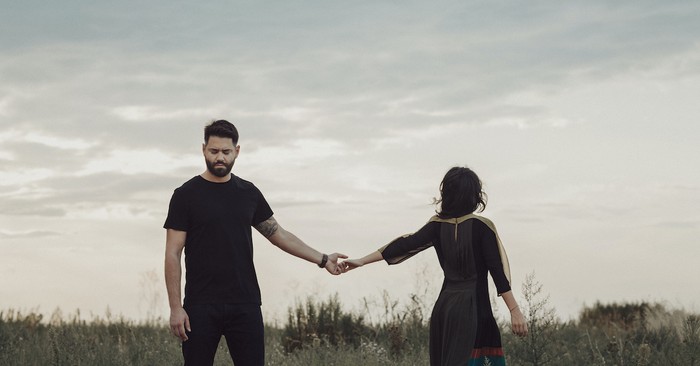
Should you date someone who doubts, or when you have doubts yourself? The answer to that question is undoubtedly tricky, and while a one size fits all response will not be given, it is important to answer it for yourself.
Three years ago, I was in a predicament that many young men and women face as they grow up: deciding who to date. At 22 years old, I had never been on a date, had anyone pursue me, or know what it was like to date someone.
When I met my boyfriend, I was appalled that a guy was pursuing me. In the past, I had been the one to express feelings only to be rejected a short time after. My heart and mind didn't know what to do when a nice guy finally took the first move and asked if I'd like to be "talking."
Now, three years later, since we met and he expressed interest in me, I have faced questions of doubt throughout our relationship time and time again.
Will he be the one I marry?
Why does he question his salvation?
Why do we have difficulty not being "too serious"?
Over this period, I have experienced great joy, laughter, and passion with the man I now love. But, I have also walked through many fires of confusion, questioning, anxiety, and pain, as with any relationship. And of these emotions, one of the most difficult to deal with has been the doubting.
Should I date someone who doubts at all? Or when I have my own doubts?
Photo Credit: © proud_natalia

1. Ask Yourself "What Do They Doubt"?
As a Christian myself, I believe that the first question to ask when dating someone is not whether they doubt at all, but what is it they doubt exactly?
Because my boyfriend struggles with severe religious scrupulosity (OCD) and I suffer from anxiety and pain (GAD and IBS-C), we are not foreign to the word doubt. Webster's Dictionary defines doubt, a noun, as: to be uncertain about (something), to believe that (something) may not be accurate or is unlikely, or to have no confidence in (someone or something). In essence, doubt is an essential uncertainty of dating that we all face.
Because you are not married to a person you are merely dating, doubt is sure to arise in any and every relationship. Paul Maxwell of Desiring God explains that this ambiguity either ends in a breakup or leads to marriage, and isn't that what dating is all about? The goal of dating is not to get mad at your partner's questions but to analyze if they are worth working through or giving up.
If your significant other struggles with questions about salvation, for example, that is an excellent subject to discuss why. My boyfriend, for instance, is a strong Christian, but because I know he has OCD, this a typical pattern for him. I am not concerned that he questions this because I know that he wouldn't care about this fear if he weren't a real Christian.
If the person you're dating is questioning if they should be dating you for specific qualities that conflict, however, that might be something worth looking into and having a discussion to seek resolution. Ben and I are certainly not the same person, but we believe our differences complement and strengthen one another.
2. Ask Yourself "Do I Doubt"?
While I am not here to tell you that you should stay in any relationship you enter into, I want to reassure you that some doubt in relationships is entirely normal. Until a ring is on your finger and you have said your vows, your partner does not belong to you; that is what marriage, a covenantal relationship is for, whether people realize that or not.
If you have doubts about your relationship, like, "Will we get married? Is he the one? Why are they weird? Why isn't this easier? Should I keep on fighting for us to work?" embrace the uncertainty of dating and enjoy the journey. However, if you have questions that provoke grave danger, including abusive or harmful situations, please seek help. It is never okay to remain in that type of relationship, and doubts you have about that should be dealt with immediately.
Maxwell comments on this principle well: "Uncertainty in dating is an unsustainable reality meant to lead you to depend on God." Although we do not like uncertainty while it is here, those unknown puzzle pieces force us to press into a known and all-knowing God.
1 John 3:20 of the NIV reminds us, "If our hearts condemn us, we know that God is greater than our hearts, and he knows everything." In our souls, we may question and investigate relationships, but at the end of the day, it's the Lord who directs our steps and knows how everything will turn out in the future (Proverbs 16:9).
Photo Credit: © Unsplash/Alex Iby

3. Ask Yourself, "Do I Want to Be in This Relationship"?
It might sound crazy, but did you know that many people remain stagnant in a relationship that they know is unhealthy for them because they fear change or losing their status on Facebook?
At this moment, if you are questioning your relationship or thinking about dating someone you're not sure about, take the time to pray, talk to God, read His Word, and meditate about the options. Weigh the pros and cons, journal, and reflect on whether investing in this relationship will add to or take away from your life.
As cliche as it is, no one is forcing you into a relationship (and if they are, run fast in the other direction), and at the end of the day, only you know if you want to be in this relationship or not.
Personally, insecurity in any relationship is something that bothers me. I have an immense fear of things not working out and cannot stand uncertainty because it scares me to the core. Perhaps at the center of that belief is that I have anxiety, a fear of losing control, though that control was never mine to hold onto in the first place.
The question of whether or not to date someone who doubts is less about doubt and more about intention. Instead, embrace the ambivalence of relationships, and learn to start asking the right questions.
As Ben and I navigate pre-engagement counseling, a series of meetings and questions designed to show us if we are compatible and should work towards engagement and marriage, the goal is not to control what happens but analyze if the Lord is leading us in that direction.
With open hands, asking questions like, "Am I ready to commit? Who am I? Who are they? What are their strengths and weaknesses? Am I ready to get married?" will not only adequately prepare you for the future no matter the outcome, but silence doubts as they come.
At times, these questions and thoughts may cause more questions, but that's precisely the point; you are getting to know one another on a deeper, personal, and more intimate level. Having doubt doesn't make you disloyal, or prove that what you feel isn't real or that you don't care. Indeed, having these reservations proves genuine concern for the relationship because if you didn't care, you wouldn't be asking these questions in the first place!
Should you date someone who doubts, or when you have doubts yourself? The answer to that question is undoubtedly tricky, and while a one size fits all response will not be given, it is important to answer it for yourself. At times, I doubt things about my relationship, as does my boyfriend. And in seasons, some tidal waves are more accessible to navigate than others. But at the end of the day, dealing with doubt is the true nature of relationships. Never underestimate the benefit and power of doubt.
As Maxwell concludes, Jesus Christ knows the anxious heart of the uncertain dating Christian (Proverbs 21:1), including who you should date and what you have doubts about along the way.
"But uncertainty is a mercy if we're prepared to receive it — it reveals to us the tensions of life itself, especially when we can't sit still long enough to listen.”
References
Enduring the Uncertainty of Dating
The Cost of Ignoring Premarital Doubt
Photo Credit: © Getty Images/clownbusiness

Want more interaction with the women of iBelieve? Join our fans, writers, and editors at the iBelieve Facebook group, Together in Faith, for more videos, stories, testimonies, prayers and more. Visit here to join the community!







